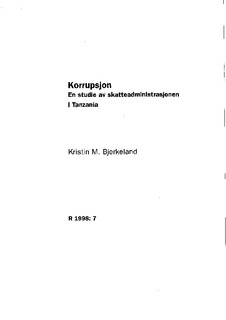Korrupsjon. En studie av skatteadministrasjonen i Tanzania
Research report
Permanent lenke
http://hdl.handle.net/11250/2435790Utgivelsesdato
1998Metadata
Vis full innførselSamlinger
- Bora-import [434]
Sammendrag
The primary concern of this study is to discuss the role of various economic factors in explaining the causes, consequences and scope of fiscal corruption in Tanzania. The emphasis is on how the incentive structure within the tax administration affects the decisions of tax collectors to engage in fraudulent behaviour, using principal-agent theory (incentive theory) as a point of departure. The paper starts with a set of research questions based on empirical observations, and examines the fundamental ideas, basic assumptions and limitations of the theoretical approach for answering these questions.The effectiveness of wage incentives, monitoring and penalty schemes in fighting fiscal corruption is discussed. The study concludes that it may be dangerous to draw conclusions from models that treat the individual tax collector as someone whose decisions are taken in splendid isolation. In a world of interacting collectors and taxpayers, gradualist anti-corruption policies may be extremely ineffective if an "everyone is corrupt" norm has become established in the organisation.
Utgiver
Chr. Michelsen InstituteSerie
Research reportR 1998: 7
